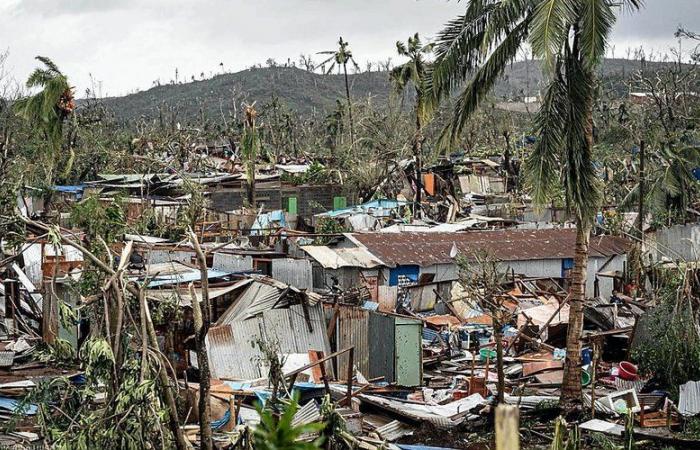
Originally from Lasalle, in the Cévennes, Gabin Bouchez, 25, has lived in Mayotte since 2022. The young man was facing Cyclone Chido when it passed on Saturday December 14.
Fifteen days later, Gabin Bouchez continues to look at the island to the horizon: “There are no more forests. There is no more.”
Arriving in Mayotte two years ago, the 25-year-old young man whose roots go back to Lasalle, in the Cévennes of Gard, where his parents live, experienced, like some 320,000 other Mahorais, the violent passage of cyclone Chido, Saturday December 14. A young graduate in architecture after studying in Montpellier and Reunion Island, Gabin Bouchez settled here, working for an architecture firm located in both departments.
The architects and engineers workshop
“It was unheard of”
“The first warnings about the cyclone came on December 10.” Unlike Reunion Island, which he knows well and where he has already experienced cyclone alerts, Mayotte is much less the target of tropical storms. “The buildings, let alone the slums, are not suitable.” Just like the locals: “Many people didn't really believe it, or didn't imagine what it could be. Others, people in an irregular situation, probably didn't go to the shelters for fear of being expelled by the following.”
However, despite his precautions, Gabin Bouchez also did not expect such a powerful cyclone. “The last cyclone in Reunion as powerful dates back to 1962. Suffice to say that in Mayotte, it was unheard of.”
On December 14, the day of the storm, the winds began to “seriously blow” from 7:30 a.m. With his roommate, in their house located in Majicavo Lamir, north of Mamoudzou, he sees Chido arriving in the distance. Very quickly, the house begins to shake, the trees fall. One of them collapsed on part of the roof. The entrance gates are torn off and thrown onto the windows. The rain, pouring down, takes over the roof. “The false ceiling collapsed under the water: it did not hold.” Pendant “more than 1 hour 30 minutes”both men maintained, “as we could”a bay window in the home. “There, we were afraid.” Luckily, they escaped unscathed.
Homeless
The next day, the two roommates resign themselves to leaving their house, which is uninhabitable. “We were also afraid of burglaries.” Their home was, in fact, broken into a few days later: several tools, including a chainsaw and their fishing harpoons, disappeared.
“Over the next five days, we slept at five people’s houses each time.” Friendship and generosity smiled upon them. Now, Gabin Bouchez, with other friends, has found refuge with a friend whose house survived the cyclone, south of Mamoudzou. “We now live a little day by day.”
Fifteen days later, electricity finally returned to homes, “after 10 days of outage”. But gasoline, the telephone network, the internet and running water, the distribution of which was already catastrophic before the tragedy, are still sorely lacking despite access to pills to purify it.
“We are supposed to be a rich country”
Since then, Gabin Bouchez has helped others however he can, “with a friend who works for a humanitarian association.” And there, he witnesses the scale of the disaster. “In certain neighborhoods, we were the first outsiders to go see the residents. No firefighter or doctors had gone there before us.” In many places, “The victims are hungry, thirsty, injured. And the rain is starting to fall again even though they no longer have shelter.”
A disaster which reveals, for him, the misery of the place: “Before, we only saw a quarter of the misery of Mayotte. The bangas (slums, Editor’s note) were largely hidden by trees. There is nothing left there. The misery is there for everyone to see.” Which accentuates his incomprehension: “We are supposed to be a rich country. There, 101e department of France is neglected.”
Cut off from the flow of information, the young man knows that part of the new government, including Prime Minister François Bayrou and Overseas Minister Manuel Valls, must land here this Sunday, December 29. Beyond politics, Gabin hopes that the drama will finally allow us to see the island develop like any French department. “I hope that there will finally be more unsanitary inhabitants in Mayotte, that the island will no longer be this reservoir of poverty.”
This is also why he chose to go there two years ago. And that he chose, after Chido, to stay there. “At the beginning, I was thinking of returning to mainland France to see my family at Christmas. But on the other hand, we came here to develop Mayotte. It needs people for that. Leaving now, after such a disaster, is is almost contradictory.”





